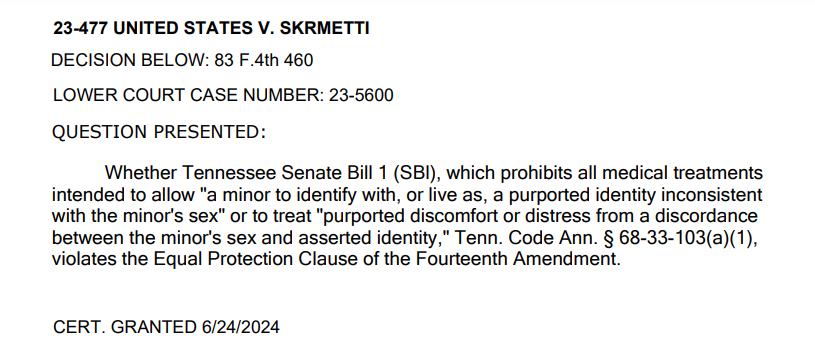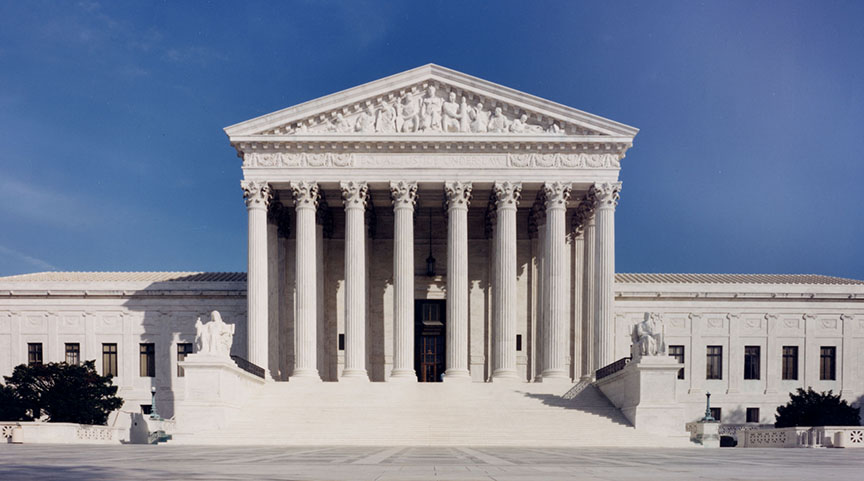Why Skrmetti is Important for Parents Fighting Gender Ideology
The United States Department of Justice has picked a fight with Jonathan Skrmetti, the Attorney General of Tennessee. The case will be heard on December 4th 2024

United States v. Skrmetti may appear at first glance to be a straightforward legal challenge to Tennessee’s SB1, a law banning gender-transition procedures for minors. However, its implications extend far beyond the courtroom and into the heart of a cultural and legal battle about safeguarding children. For parents who oppose gender identity ideology and seek to protect their children from irreversible medical interventions, Skrmetti represents a pivotal moment.
This case is not just about one state’s legislative agenda—it is about the fundamental rights of parents to protect their children from medical, ideological, and cultural trends that they believe are harmful. It asks whether the state can intervene to prevent the imposition of irreversible medical treatments on children too young to give informed consent, even when pressured by activist-driven narratives. In doing so, it places the rights of protective parents front and centre in a global conversation about childhood, identity, and medical ethics.
A Voice for Parents Fighting Back
For years, parents concerned about the encroachment of gender ideology into schools, healthcare systems, and public policy have faced a daunting challenge. In many cases, their objections have been dismissed as transphobic, bigoted, or simply out of touch. Yet Skrmetti gives a voice to these parents by questioning whether society has gone too far in prioritizing ideological affirmation over biological reality and child safeguarding.
Tennessee’s SB1 bans puberty blockers, hormone treatments, and surgeries for minors seeking to transition. It does so not to infringe on personal freedoms but to uphold the principle that children cannot meaningfully consent to interventions with life-altering consequences. The state argues that the long-term safety and efficacy of so-called ‘gender-affirming care’ remain uncertain and that the law is a legitimate safeguard against what amounts to medical experimentation. For parents who see themselves as guardians against a harmful ideology, this is an important recognition of their concerns.
Parental Rights Under Threat
Skrmetti also highlights the rights of parents who reject gender identity ideology. In some jurisdictions, affirming a child’s transgender identity has become an expectation, even a requirement, for parents. Families have faced legal challenges, child protection investigations, and social ostracism for questioning or resisting such ideologies. This case underscores the principle that parents, not activists or medical professionals influenced by ideology, should have the final say in their children’s upbringing and healthcare—especially when the interventions in question are irreversible.
A ruling in favour of Tennessee could affirm the state’s right to act in the interest of child safeguarding without overriding the rights of parents who do not consent to medical transition for their children. Conversely, a decision against the law might embolden policies that pressure parents to comply with affirmation models, undermining their ability to protect their children from the psychological and physical consequences of such treatments.
A Global Impact on Gender Ideology
Skrmetti’s importance extends beyond U.S. borders. Around the world, countries are grappling with how to respond to the rising tide of gender ideology in schools, healthcare, and public life. Nations like Sweden and Finland, which have recently restricted gender-transition treatments for minors, provide examples of what a cautious, evidence-based approach can look like. If the U.S. Supreme Court upholds SB1, it will lend credibility to such measures and encourage other governments to prioritize child safeguarding over ideological affirmation.
For parents in the UK and elsewhere, where gender ideology is embedded in public institutions, Skrmetti could serve as a rallying point. It would signal that governments can and should intervene when ideology threatens the well-being of children, reaffirming that parental rights are a cornerstone of a free and fair society.
Conclusion
United States v. Skrmetti is not just a legal case; it is a cultural moment with profound implications for families worldwide. It represents an opportunity to reaffirm the rights of parents to protect their children from the harms of an ideology that prioritizes affirmation over inquiry and safeguarding. This is not about denying care but about ensuring that decisions affecting children’s futures are made with caution, evidence, and the true best interests of the child at heart.
For parents resisting the influence of gender ideology, Skrmetti is a beacon of hope—a chance to restore the balance between parental authority, state responsibility, and the rights of children to grow up free from harm. It matters not just for Tennessee, but for every family fighting to preserve truth, ethics, and justice in an increasingly ideologically driven world.
Parents including those from Our Duty, will be demonstrating in support of Jonathan Skrmetti at the Supreme Court in Washington D.C. Wednesday, December 4, 2024 8:00 AM-12:30 PM The steps of the United States Supreme Court 1 First St. NE, Washington, DC 20542
Our Duty has submitted an amicus brief by Erin Friday of Our Duty USA
Other amicus briefs can be found on the US Supreme Court website.

